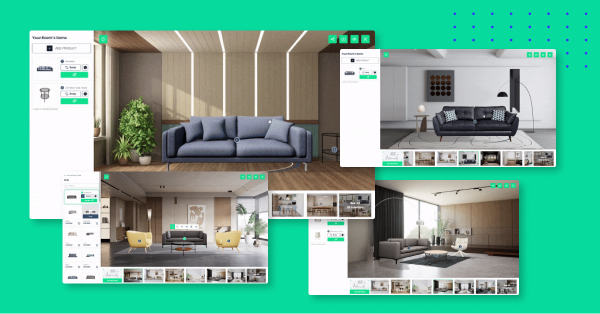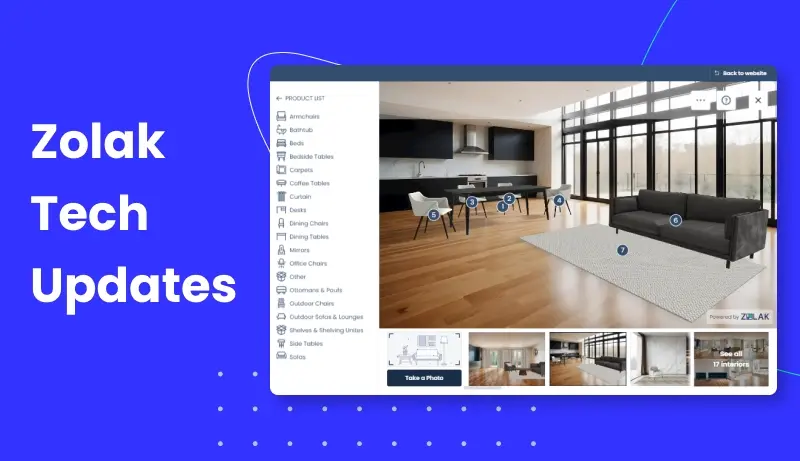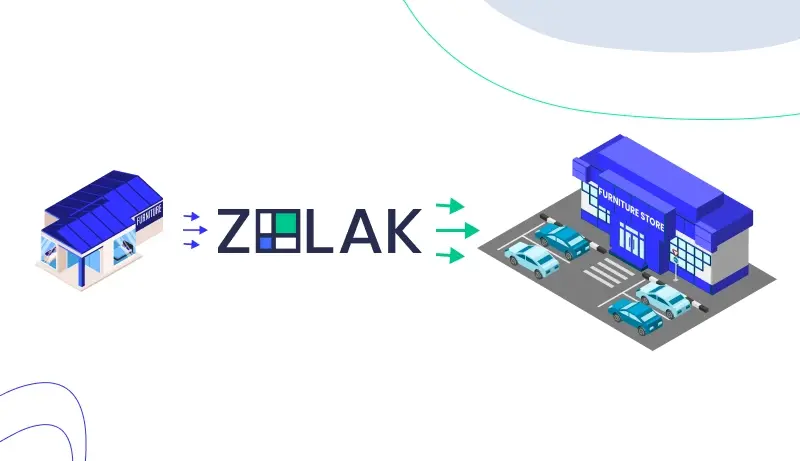12 Best eCommerce Tools That Retailers Need in 2026
Why are ecommerce tools important, you ask? Well, they're like handy helpers in the digital world, making life easier for us humans.
Whether you're setting up a website from scratch, keeping tabs on your sales figures, or adding interactive features to engage customers, ecommerce tools are the backbone of online businesses worldwide. They help furniture businesses thrive and stay ahead of the curve in a world where everyone's clicking and swiping.
We're about to dive into the world of the top ecommerce and marketing tools that'll turbocharge your online furniture business and make it shine brighter than ever before.
What is an eCommerce Tool?
eCommerce tools encompass a wide range of software solutions, including apps, plug-ins, and platforms, designed to streamline and automate various aspects of managing an ecommerce store.
Think of e-commerce tools as the building blocks of your online store. They take care of the nitty-gritty details so you can focus on what really matters: growing your furniture business and delighting your customers.
Why are eCommerce Tools Important?
Furniture businesses rely on tools for a variety of purposes:
-
Reaching more customers online: Whether it's through social media integrations, search engine optimization, or targeted advertising, these tools help you get your furniture in front of more eyeballs.
-
Creating an engaging shopping experience: Ever visited an online store that just felt dull and uninspiring? Yeah, not exactly the vibe you want for your furniture business. Ecommerce tools allow you to create a visually stunning and user-friendly shopping experience that keeps customers coming back for more.
-
Streamlining store operations: These tools simplify and optimize day-to-day tasks, making it easier to manage everything from product listings to order fulfillment.
-
Collecting first-hand data for your campaigns: Knowledge is power. Ecommerce tools provide valuable insights into your customers' behavior and preferences. This data helps you tailor your marketing campaigns for maximum impact, driving sales and fostering customer loyalty.
-
Managing inventory without errors: Advanced inventory management features ensure that businesses always have the right products in stock, reducing the risk of overstocking or stockouts.
-
Selling 24/7: Your store might have closing hours, but your online shop? It's open for business round the clock, thanks to ecommerce tools. This means you can make sales even while you sleep, reaching customers in different time zones and maximizing your revenue potential.
-
Boosting brand differentiation: Offering an exciting shopping experience sets your brand apart from competitors and leaves a lasting impression on customers, encouraging repeat purchases and referrals. Through social media engagement, personalized emails, and interactive content, you can connect with your audience on a deeper level, fostering a sense of community and loyalty around your brand.
With this foundational understanding, let's explore some of the best tools for ecommerce to help you manage different aspects of your online store.
#1. Shopify: Best e-commerce platform for small and midsize businesses

Originally designed with people in mind rather than solely focusing on generating income, Shopify remains an excellent option for small to medium-sized furniture stores.
Key Features:
-
Optimized for mobile devices: Reach customers on the go with a mobile-responsive design that ensures a seamless shopping experience across all devices.
-
Website and shopping cart creation: Effortlessly create and customize your online store and shopping cart with Shopify's ecommerce website tools and templates.
-
Access to consumer data: Gain valuable insights into customer behavior and preferences with access to comprehensive consumer data, empowering you to tailor your marketing strategies accordingly.
-
Unlimited product inventory: Scale your e-commerce business without limitations by showcasing an unlimited number of products in your Shopify store.
-
Supports all popular payment methods: Accept payments from customers worldwide with support for all major payment gateways, ensuring convenience and accessibility for your shoppers.
Pricing: Basic, Shopify, and Advanced Shopify. These plans start at $56, $149 and $575 per month, respectively. Each plan comes with its own set of features and functionalities tailored to different stages of growth and scale.
#2. Adobe Commerce (Magento): Best e-commerce platform for large businesses

Adobe Commerce, powered by Magento, stands as an open-source ecommerce platform that has evolved into a key component of the Adobe Experience Cloud, a suite dedicated to crafting personalized digital experiences across diverse channels and devices. This integration of Adobe Commerce into the Adobe ecosystem has unlocked a realm of possibilities for merchants seeking to establish and manage both B2C and B2B online stores, enriched with extensive features, functionalities, and customization options.
Key Features:
-
Seller-assisted shopping: Empowering sales representatives or customer support agents to assist customers in placing orders directly through their accounts.
-
Live search: Enabling customers to find products swiftly with instant results powered by AI-driven algorithms.
-
Product recommendations: Leveraging Adobe Sensei's machine-learning capabilities to deliver tailored product recommendations, thereby enhancing cross-selling and upselling opportunities while maximizing customer satisfaction.
-
Page builder: Offering a user-friendly drag-and-drop interface for creating and editing content pages, along with dynamic block creation capabilities to enhance visual appeal and engagement.
-
Catalog service: Providing a centralized repository for managing product catalogs across multiple websites and stores, with optimization features for performance enhancement and efficient management.
-
Inventory and order management: Offering real-time visibility into inventory availability and seamless order fulfillment across all channels, ensuring customer expectations are met consistently.
-
Store fulfillment: Optimizing order fulfillment processes by bridging online and offline channels, with features such as click-and-collect, ship-from-store, and inventory reservation options.
-
PWA studio: Empowering ecommerce businesses to create progressive web apps (PWAs) that deliver fast, engaging, and mobile-friendly shopping experiences, enhancing accessibility and user satisfaction.
-
Customer segmentation: Facilitating targeted marketing strategies by segmenting customers based on attributes and behaviors, enabling personalized content, promotions, and pricing for each segment.
-
Business intelligence: Centralizing ecommerce data and visualizing it through charts, graphs, and other forms, enabling merchants to gain insights into cross-channel trends, sales performance, customer behaviors, and marketing effectiveness.
-
Cloud delivery: Offering cloud-based services for ecommerce operations, with continuous releases, monitoring, development tools, and deployment efficiencies, bolstered by robust security measures and PCI compliance services.
-
Payments and financing: Centralizing payment and order data from multiple storefronts, facilitating cash flow management and ensuring liquidity as needed.
Pricing: Adobe Commerce employs a unique pricing model based on the annual Gross Merchandise Value (GMV) and Average Order Value (AOV) of your ecommerce business. GMV represents the total value of merchandise sold within a specific timeframe, while AOV denotes the average amount each customer spends per transaction. The pricing structure is designed to align with your business's growth and success, with higher GMV and AOV resulting in an increased license fee.
Starting at $22,000 annually, Adobe Commerce offers a robust suite of features and functionalities to support businesses of varying sizes and complexities. As your GMV and AOV increase, the pricing scales accordingly, with the potential for annual fees reaching up to $125,000.

#3. WooCommerce: Best for retailers using WordPress
If you're already running a WordPress website, seamlessly integrating ecommerce functionality is just a plugin away with WooCommerce. From selling physical products to managing subscriptions and memberships, WooCommerce offers a comprehensive suite of features to transform your WordPress site into a fully-fledged online store.
With a myriad of themes and extensions available, you can tailor your online store to suit your brand's unique identity and customer preferences. Moreover, WooCommerce seamlessly integrates with a range of popular payment platforms, including Stripe, Square, PayPal, Amazon Pay, and more. This ensures a smooth and secure checkout experience for your customers, regardless of their preferred payment method.
Once your store is operational, increasing your average order value becomes critical for business growth. Using powerful upselling and cross-selling strategies can significantly boost your revenue by encouraging customers to purchase complementary items or upgrade their selections.
For existing WordPress users, WooCommerce offers the most straightforward path to start selling online without the need for a complete website overhaul. Simply install the plugin, customize your settings, and you're ready to start selling your furniture products to customers around the world.

Pricing: While WooCommerce itself is free to add to a WordPress site, the overall cost of using WooCommerce will depend on the specific functions and features you choose to incorporate into your online store.
-
Hosting costs: $120 per year (on average, but varies widely)
-
Domain registration: $15 on average, but could be much more expensive if purchasing a domain from a private seller
-
Theme cost: $0 for free themes
$200+ for one time payments -
Shipping costs: $0 — $119 per year, depending on any additional tools
-
Payment gateway costs: 2.9% + $0.30 per sale on average
-
Communications: Free to $119 per year, depending on the e-commerce tool used
-
Security: Free to $239 per year, depending on the e-commerce tool used
-
SSL certificate: Typically free
-
Customer experience: $0-$200/extension per year
-
Plugins costs: $0-$200/plugin per year
-
Developers hiring: $10- $100+ per hour
$1,000 to $20,000 to design and build your entire site from scratch.
#4. Zolak: Best e-commerce marketing tool

Zolak is SaaS that enables online furniture retailers to create interactive showrooms on their websites, offering an immersive 3D shopping experience that allows customers to explore, combine, and visualize furniture products, including in their own homes.
Whether you're using Shopify, WooCommerce, BigCommerce, or Magento, Zolak seamlessly integrates to offer a cutting-edge shopping experience to customers. This integration eliminates the need for extensive technical expertise or development resources.
Key Features:
-
Zolak Showroom: Engage customers with interactive AI-powered 3D virtual rooms directly on your website. Transport them to pre-designed spaces showcasing furniture in various styles, color schemes, and settings. With a simple snapshot, customers can digitally transform their own rooms, replacing existing furniture and experimenting with new items from your catalog.
-
Zolak 3D Configurator: Showcase any furniture product with unparalleled detail and customization. Customers can view products from every angle and in any variation, easily changing colors and previewing furniture pieces in various combinations. This provides them with a realistic and personalized preview of their potential purchases, enhancing their buying experience.
-
Zolak Studio: Elevate your visual storytelling with limitless imagery capabilities. Retailers can effortlessly generate a multitude of images for each furniture piece, eliminating the need for extensive and costly photoshoots. Customers benefit from a comprehensive exploration of products, gaining a 360-degree understanding of each item's design and features.
Pricing:
-
Zolak Visual Commerce Suite: Starting at $290 per month, gain access to the full suite of Zolak's visual tools for e-commerce.
If you prefer to purchase each product separately, please reach out to Zolak managers to inquire about specific pricing for Zolak Showroom, Zolak 3D Configurator, and Zolak Studio.
#5. Omnisend: Best eCommerce e-mail & SMS marketing tool

This ecommerce marketing tool simplifies the process of building email lists with customizable landing pages and popups, offering a plethora of ready-made templates for crafting engaging emails. With Omnisend, users can personalize their email campaigns and drive sales through automated workflows like abandoned cart recovery and welcome sequences. The platform's 24/7 email and live chat support ensures that users receive assistance whenever needed, irrespective of their plan.
Key Features:
-
Effortlessly create and send email marketing campaigns, newsletters, and global SMS campaigns.
-
Utilize a variety of signup forms, including exit-intent popups and spin-to-win, to grow your email list.
-
Access a library of pre-designed email templates suitable for various occasions and promotions, eliminating the need for coding.
-
Implement automated workflows such as abandoned cart recovery and welcome sequences with just a few clicks.
-
Leverage over 20 ready-made automations to personalize customer interactions and drive sales.
Pricing:
-
Free plan provides access to the software's most basic functions, allowing businesses to get started without any upfront costs.
-
After a free trial, paid plans start at $16 per month, offering additional features and capabilities to help businesses scale their marketing efforts effectively.
#6. ReferralCandy: Best e-commerce affiliate marketing tool

ReferralCandy is your ultimate companion for harnessing the power of word-of-mouth marketing to drive sales growth and foster customer loyalty. With its intuitive platform, you can effortlessly reward your customers for referrals, inspiring them to spread the word about your brand and attract new customers.
Key Features:
-
Customizable referral program: Tailor your referral program to suit your brand and audience, offering rewards that incentivize both referrers and their friends to engage with your business.
-
Versatile reward options: Choose from a variety of reward options, including store discounts, cash payouts, and custom rewards, allowing you to incentivize referrals in a way that aligns with your brand values.
-
Advanced fraud management: Stay vigilant against fraudulent activities with ReferralCandy's advanced fraud management features, empowering you to identify and address suspicious referral behavior effectively.
-
Automated promotion: Automatically invite customers to join your referral program at strategic touchpoints, such as after checkout, streamlining the recruitment process and maximizing participation.
Pricing: Starting at $59 per month plus a 3.5% commission.
#7. Tidio: Best e-commerce customer support tool

Tidio offers a range of invaluable products designed to streamline communication, boost efficiency, and drive customer satisfaction.
Key features:
-
Lyro AI agent: The conversational AI that speaks directly to your audience. Lyro effortlessly handles up to 70% of common customer questions, freeing up your human agents to tackle more complex requests. With an impressive average response time of under 6 seconds, Lyro ensures customers receive timely and detailed answers, tailored to their specific queries. Plus, with its ability to understand context and recall previous interactions, Lyro guarantees a seamless and satisfying customer experience every time.
-
Live chat & helpdesk: Consolidate your interactions into one streamlined platform, enabling you to respond to customer inquiries promptly and efficiently. Utilize canned responses to address common questions in seconds, while also gaining insights into visitor activity to make personalized product recommendations.
-
Analytics: Gain valuable insights into customer behavior and preferences, allowing you to identify peak demand periods and optimize your strategies accordingly. Armed with this knowledge, you can fine-tune your operations, deliver stellar service during high-traffic periods, and ultimately drive greater success for your furniture store.
Pricing:
-
Free
-
Email marketing ($10/mo)
-
Starter ($29/mo)
-
Marketing automation ($29/mo)
-
Growth ($59/mo)
-
Lyro AI ($39/mo)
-
Tidio + (starting from $394/mo)
#8. NapoleonCat: Best social media management tool

With its intuitive interface, NapoleonCat simplifies the process of publishing and scheduling content across a variety of popular social media channels, all from a single, user-friendly dashboard. Additionally, the platform boasts robust moderation features that empower marketing teams to effectively engage with potential customers and manage interactions seamlessly.
Key Features:
-
Social media analytics: Gain valuable insights into your social media performance with comprehensive analytics tools, allowing you to track key metrics and optimize your strategies for maximum effectiveness.
-
Agency and team management: Collaborate seamlessly with team members and manage multiple accounts with ease, ensuring smooth workflow and efficient task delegation.
-
Engagement tracking: Monitor and track engagement levels across your social media channels, enabling you to identify trends, respond to comments, and foster meaningful interactions with your audience.
-
Competitor tracking: Stay ahead of the competition by keeping tabs on competitor activity and performance metrics, allowing you to benchmark your own efforts and identify areas for improvement.
Supported Channels:
-
Facebook
-
LinkedIn
-
Instagram
-
Facebook Messenger
-
Google My Business
-
YouTube
-
TikTok
Pricing:
-
Standard plan: Priced at $32 per month, the Standard plan includes support for three profiles and one user.
-
Pro plan: Available for $76 per month, the Pro plan offers enhanced features and support for three profiles and one user.
-
Custom plans: For businesses with unique requirements, custom plans are available upon request. To explore custom pricing options, simply reach out to the NapoleonCat team.
#9. Partial.ly: eCommerce businesses looking to offer flexible payment plans

Partial.ly is your solution for offering flexible payment plans to customers, empowering them to shop for what they want with convenient installment terms that fit their budget.
With Partial.ly, integration is seamless with many popular ecommerce and invoicing platforms, ensuring compatibility with your existing stack. Whether you're using Shopify, WooCommerce, BigCommerce, Magento, or Intuit Quickbooks, Partial.ly seamlessly integrates to streamline your operations.
Key features:
-
Customized payment plans: Tailor payment plans to suit your customers' needs, offering flexibility and convenience for their purchases.
-
Automated payments: Enjoy the convenience of automated payments, saving time and effort while ensuring timely transactions.
-
State-of-the-art security: Rest assured knowing that Partial.ly prioritizes security, providing peace of mind for both you and your customers.
Pricing: Partial.ly operates on a simple and transparent pricing model, charging a fee of 5% plus 30₵ per transaction. This pricing is consistent across over 135 currencies supported by Stripe, making it easy to understand and manage your costs.
#10. ShipStation: Best e-commerce shipping and inventory management tool

ShipStation stands as a premier shipping software platform for ecommerce, renowned for its seamless integration capabilities, efficient shipping workflows, and user-friendly interface.
Key Features:
-
Import & manage orders: Seamlessly connect all your selling channels within one user-friendly dashboard. Gain comprehensive control over your orders throughout the fulfillment process. Easily view, sort, and filter orders, split orders into multiple shipments, combine orders into single shipments, set up customized alerts, and edit imported orders on-the-go.
-
Manage inventory: Efficiently oversee your inventory from anywhere with ShipStation's cloud-based inventory ecommerce management tool. Keep track of stock levels, set inventory alerts, and allocate stock seamlessly while improving order fulfillment efficiency. Leverage custom reports for real-time insights, better forecasts, and faster pick & pack operations.
-
Brand deliveries: Create personalized and memorable delivery experiences for your customers at no additional cost. ShipStation powers branded shipping through various services, including real-time branded tracking pages, self-service branded returns portals, automated customer emails, and customizable packing slips and carrier labels.
Pricing:
-
Startup: $25/mo. - 500 shipments/mo.
-
Accelerate: $65/mo. - 3,000 shipments/mo.
-
Scale: $155 /mo. - 7,500 shipments/mo.
-
High volume: Unlimited shipments/mo. - Speak to an expert from ShipStation
#11. Google Analytics: Best e-commerce analytics tool

With Google Analytics, marketing teams can gain invaluable insights into their target audience's browsing behavior and journey across different stages, empowering them to optimize marketing strategies and maximize ROI.
Key Features:
-
Simple and easy-to-use interface: Whether you're tracking website traffic or analyzing user behavior, Google Analytics provides intuitive e-business tools and visuals to streamline the process.
-
Machine learning capabilities: The tool uses advanced machine learning algorithms to provide predictive insights and recommendations, aiding marketers in making informed decisions based on user behavior patterns and trends.
-
Shareable reports: Empower your team to access and analyze key metrics effortlessly, facilitating data-driven strategies for your furniture retail business.
Pricing: Google Analytics is free to use for basic analytics tracking. However, for more advanced features and capabilities, such as Analytics 360, you'll need to get in touch with Google Marketing Platform's sales team. Analytics 360 offers additional functionalities tailored to enterprise-level businesses, providing enhanced insights and customization options.
#12. Ahrefs: Best e-commerce SEO tool

When it comes to skyrocketing your ecommerce website's visibility on search engines, look no further than Ahrefs.
Key Features:
-
Analyze competitors: Gain a competitive edge by dissecting your rivals' strategies and uncovering their strengths and weaknesses.
-
Conduct in-depth keyword research: Discover high-value keywords that drive traffic and conversions to your ecommerce site, ensuring your content is optimized for maximum visibility.
-
Monitor website performance: Track your website's performance with precision, identifying areas for improvement and capitalizing on successful tactics.
-
Optimize content: Fine-tune your content strategy with insights from Ahrefs, ensuring every piece of content is tailored to your target audience and optimized for search engines.
-
Accurate rank tracking: Keep tabs on your website's search engine rankings with precision, ensuring you're always aware of your position in the SERPs.
Pricing:
-
Lite plan: $99 per month
-
Standard plan: $179 per month
-
Advanced plan: $399 per month
-
Agency plan: $999 per month
Conclusion
The right ecommerce tools have the potential to revolutionize your online business operations. Whether you're embarking on your ecommerce journey or seeking to enhance engagement of your content and campaigns, our curated list of the best e-commerce tools and essential tools needed for an ecommerce website has something for everyone.
It's important to highlight that many of these services provide a free trial or demo. Seize this opportunity to assess whether a platform's features align with your goals and business objectives, ensuring you make an informed decision about incorporating it into your operations.
.png?width=450&height=415&name=Frame%207862%20(1).png)




